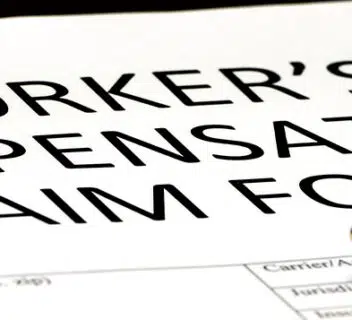Whether you work on construction sites or in a downtown office on the 99th floor, all employees run the risk of sustaining a work illness or injury. Although some professions face a greater risk compared to others, that doesn’t mean employees in “less risky” jobs should have their workers’ compensation cases neglected or devalued.
In case of an injury while on the clock, you’re entitled to workers’ compensation benefits to pay for your medical costs and lost wages. These benefits often come through regular workers’ compensation insurance that is covered by your employer’s insurance company. But what if you receive an offer for a lump sum settlement instead?
In understanding workers’ compensation laws, it’s important to consider the long-term impact of your work-related injury or illness. These laws are designed to protect you by ensuring you receive the necessary medical benefits and financial support during your recovery period. Sometimes, the effects of an injury can last for a long time, perhaps even a lifetime.
That’s where workers’ compensation plays a crucial role. It provides ongoing medical benefits and covers costs associated with long-term care, which might include surgeries, physical therapy, and any required medications. Knowing how these laws work helps you make informed decisions about your health and financial well-being following a workplace injury.
Questions that this article can help to answer:
- Will I get a workers’ comp settlement?
- How soon will the insurance company offer a workers’ comp settlement?
- What are the two types of settlements for workers’ compensation?
- How is a workers’ comp settlement determined?
- How much should a workers comp settlement be worth?
- How long do most workers’ comp settlements take?
- What do I need to know about an early settlement offer?
- Will workers’ comp offer a settlement without a lawyer?
- How do I find a labor lawyer near me?
Will I Get a Workers’ Comp Settlement?
If you’re wondering about receiving a workers’ comp settlement, it’s important to understand that not all workers’ comp cases result in a settlement. Settlements in workers’ comp are agreements where the insurance company agrees to pay you a certain amount of money.
In return, you might give up certain rights, like future claims related to your injury. Whether you get a settlement largely depends on the specifics of your case, including the severity of your injury and how it affects your ability to work.
Factors Influencing Settlements:
- Severity of Injury: More serious injuries often lead to larger settlements because they impact your life more. This includes long-term medical care and inability to work.
- Medical Benefits: Part of your settlement might include medical benefits, which cover ongoing treatment costs.
- Lost Wages: If you can’t work because of your injury, your settlement may include compensation for lost wages.
- Permanent Disabilities: In cases of permanent disability, settlements are likely as they account for future challenges and financial needs.
Does Surgery Increase Workers’ Comp Settlement?
In many workers’ comp cases, if surgery is necessary, it might increase the settlement amount. Here’s why:
- Higher Medical Costs: Surgeries are expensive, increasing the overall medical costs that need to be covered.
- Extended Recovery Time: Surgery often means you’ll need more time off work to recover, increasing the compensation for lost wages.
- Long-term Effects: Surgery can indicate a more serious or permanent injury, which might lead to a higher settlement due to long-term health needs and impacts on your life.
Remember, each workers’ comp case is unique. The necessity of surgery and its impact on a settlement will vary. Consulting with a skilled attorney who understands workers’ comp benefits and laws can provide you with the best guidance tailored to your specific situation.
How Soon Will the Insurance Company Offer a Workers’ Comp Settlement?
If you are awaiting a workers’ comp settlement offer, it’s imperative to understand the factors in play. From an outside perspective, workers’ compensation settlements might sound enticing.
For example, you receive one lump sum (sometimes hundreds of thousands of dollars), which you will then use to help pay for your medical costs and lost wages. You get to pocket anything that might be left over. It might sound like a great offer; however, these offers always warrant a second look and the opinion of an experienced workers’ comp attorney.
Reaching a Workers’ Comp Settlement
Suppose an employee has fully recovered from their illness or injury and has returned to work without any remaining bills or unpaid benefits. In that case, their workers’ compensation claim can be closed. However, sometimes a claim requires a negotiated settlement between the injured worker (and their attorney) and the insurance company.
This process usually starts with the insurance company and the employer making an offer for payment to the employee. Depending on the type and extent of the employee’s illness or injuries, the settlement offer might include payments for:
- Unpaid benefits or medical bills
- The costs of any necessary future medical treatment
- A disability award if the worker is permanently impaired
Types of Workers Compensation Settlements
There are two types of Workers’ Compensation settlements. They are:
- Lump Sum Payment
- Structured Payment
Lump Sum Payment
A single payment for all medical costs and benefits the employee claims. In some states, the injured worker may have to agree not to pursue any future compensation related to the same injury.
Structured Payment
The settlement monies are divided into scheduled payments over a specified amount of time. A structured settlement might include a separate medical account to pay for any necessary future medical care.
When Will Workers’ Comp Offer a Settlement in California?
In California, if you get hurt at work, you might wonder when you’ll get a settlement offer from workers’ comp. Here’s a simple breakdown:
- Injury Report: First, you must report your workplace injury to your boss. This gets your workers’ comp case started.
- Case Review: After you report your injury, your case is looked at. The insurance company checks your medical records and other details to understand your injury better.
- Maximum Medical Improvement (MMI): This is a key moment. MMI means your condition isn’t expected to improve much more. In California, settlement talks usually start after you reach MMI. It’s when everyone has a clearer picture of your health and future needs.
- Settlement Types: In California, you might get offered a lump sum (all the money at once) or a structured settlement (money paid over time).
- Negotiation: Your lawyer and the insurance company will talk about the settlement. They consider your medical costs, any lost wages, and how the injury affects your life.
- Judge’s Approval: Finally, a workers’ comp judge looks at the deal to make sure it’s fair.
Remember, settlements in California can take different times to reach. It depends on how serious your injury is and how long your recovery takes. Always talk to a lawyer to make sure you’re getting a fair deal. They know the rules and can help you understand your rights.
How Is a Workers’ Comp Settlement Determined?
Before agreeing to a settlement, the employee and their lawyer should calculate what they believe the claim is worth. It should at least be enough to cover past medical care and future medical costs for the injury. Other factors that can impact the settlement include:
- Medical bills
- The need for future medical treatments, including surgery or physical therapy
- Previously lost wages or future wage loss
- Temporary or permanent disability payments
- Attorney fees
- State workers’ compensation statutes and restrictions
Once the calculation is finalized, the employee and their attorney will negotiate with the insurance company. The final settlement is frequently a compromise between the insurance company, employer, and the injured employee under the advisement of their attorney.
It’s a common requirement in many states to have a workers’ compensation judge review each settlement before it’s finalized. Although the judge will consider if it is fair to the employee, it is still in the employee’s best interest to have a workers comp attorney on their side to protect their rights.
How Much Should a Workers’ Comp Settlement Be Worth?
Calculate Workers Compensation Settlement
Workers’ compensation settlement amounts are typically based on what the case is likely to cost the workers’ compensation insurance company if the case fails to settle. Most of the time, the insurance company wants to reach a settlement before you get to the point of what is known as Maximum Medical Improvement (MMI).
Once you reach this point, you will likely have a good idea of your future medical expenses, which means you will have a better idea of what your case is really worth. If the insurance company can get you to accept a low workers comp first settlement offer, they will most likely pay less for your claim. That’s wonderful for them but terrible for you.
Workers Comp Settlement Amounts
How Long Do Most Workers’ Comp Settlements Take?
The truth is that it varies. For claims involving relatively minor injuries, a workers comp settlement offer letter won’t take as long. However, it can take longer for those with severe or catastrophic injuries. What’s more important than how long it takes to receive a settlement, is that you are receiving a fair settlement.
While you may be relieved to receive an early settlement offer, it’s not always in your best interest to accept an early offer. Here are three instances in which a longer case settlement may be beneficial:
- Concerns about paying for medical bills
- Unable to go to work
- Affording medical expenses related to your injury at work
An Early Settlement Doesn’t Necessarily Mean a Fair Settlement
In fact, it is never in your best interest to accept an offer without discussing your case with a qualified workers’ compensation lawyer. An experienced attorney will have a pretty good idea of what a fair settlement should be in your case. They can let you know if you should settle at this point or hold out until you receive a better offer or reach MMI.
You should also keep in mind that waiting until most or all of the anticipated benefits you can receive have been paid out will make the value of your case lower than it could have been if settled earlier.
Will Workers’ Comp Offer a Settlement Without a Lawyer?
Navigating a workers’ comp case can be complex, and you might be wondering if you can receive a settlement offer even without hiring a lawyer. Understanding how the system works and the importance of legal advice is crucial in such situations.
The Possibility of an Offer
- Direct Offers: Yes, it is possible to receive a workers’ comp settlement offer without a lawyer. Insurance companies sometimes make offers directly to injured workers. However, these offers may not always reflect the full value of your claim.
- Initial Assessments: The insurance company will evaluate your case based on the medical reports and the details of your injury. They may then propose a settlement amount to cover your medical expenses and lost wages.
The Role of Legal Advice
- Understanding Your Rights: A major concern when dealing with workers’ comp without a lawyer is the lack of understanding of your legal rights. Legal advice is critical to ensure that your rights are protected and that you are fully aware of what you are entitled to under the law.
- Evaluating Offers: An attorney specializing in workers’ comp can help evaluate if the offer made by the insurance company is fair. Without this expertise, you might end up accepting a settlement that is significantly lower than what you could receive with legal representation.
Accepting a Settlement
- Consideration: Before accepting a settlement, consider the long-term implications of your injury. Will there be ongoing medical expenses? Could your injury affect your ability to work in the future?
- Negotiation: Without a lawyer, you might lack the negotiation skills necessary to increase the settlement offer. Lawyers are experienced in negotiating with insurance companies and can often secure a more favorable settlement.
- Finalization: Accepting a settlement usually means you waive certain rights, such as bringing any future claims related to the injury. Legal advice is crucial to understand these implications fully.
While it’s possible to receive and accept a workers’ comp settlement without a lawyer, it’s not always advisable. The lack of legal representation can lead to accepting an offer that doesn’t adequately cover your needs, especially considering long-term implications. A lawyer can provide essential legal advice, help in evaluating and negotiating offers, and ensure that your rights are fully protected.
Remember, the goal of workers’ comp is to support you during your recovery and ensure you’re not financially burdened due to a work-related injury. Professional legal assistance can be invaluable in achieving this goal.
How Do I Find a Labor Lawyer Near Me?
If you have questions about work injury lawsuit settlements or other aspects of a workers’ comp claim, 1-800-THE-LAW2 has a network of local attorneys with answers. You can find an experienced labor lawyer or workers’ compensation lawyer near you by completing our online form for free consultation. Once submitted, a licensed workers’ comp attorney in your area will call you within ten minutes to help you with your workers’ comp case.
You can also give us a call for FREE legal consultation. We are open 24/7.






